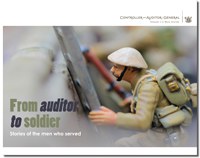Frank George Ludbrook
Frank George Ludbrook was originally from London and joined the Audit Department in July 1915, as an Audit Examiner, Class VII. He had passed the Senior Civil Service Examination.
Frank was 25 years old when he joined the New Zealand Expeditionary Force in November 1916. He was posted overseas in April 1917 with the Divisional Signallers Corps. Signallers usually worked close to the front line, mainly in helping to target the enemy. Where possible, telephone lines were laid, but often reliance was on morse code messages through the use of a heliograph (mirror system) during the day. At night, signalling lamps were used. This was dangerous work, because using heliographs or lamps tended to attract enemy fire.
Other dangers faced by signallers are described in the Official History of the New Zealand Rifle Brigade:
In performing the duties in connection with the establishment and maintenance of communications, so vital an element in the successful conduct of operations, only the signaller knows the trials and dangers that have to be faced. It is shell-fire that cuts his wire, and it is under shell-fire that he must go out and find and mend the break, and that without a moment’s unnecessary delay.
Soon after arriving in the United Kingdom, Frank was admitted to hospital in June 1917 with influenza. After a month in hospital, he was discharged and sent to the New Zealand Expeditionary Force training base at Sling (north of London). He was promoted to Sergeant in February 1918 and sent to France in March 1918. After three months in France, Frank fell ill and was admitted to hospital. He spent six weeks in hospital before rejoining the Signallers Corps.
In February 1919, Frank was transferred to an administrative position in London, with the “Area Employment Corps”. The Employment Corps was responsible for work such as maintaining telegraph and telephone systems. He returned to New Zealand in November 1919 and was discharged from the New Zealand Expeditionary Force in January 1920. He was awarded the British War Medal and the Victory Medal.
Frank rejoined the Audit Department as an Audit Examiner, Class VI, based in Christchurch. In 1930, Frank held the position of Audit Inspector, Auckland. In 1931, he was involved in a Court case where his audit work had identified fraud by an engineer at Waitemata County Council.
He later held the position of Audit Inspector, Wanganui. When Frank retired from the Audit Department in 1955, he held the position of Audit Inspector, Wellington.
Frank died in 1977.

